On this page
Key reasons for the UK failure in 2008
The last days of the British store chain
Saving the best until last, new news in 2024
Key reasons for the UK failure in 2008

The new Board of the British Woolworths made mistakes after demerging from Kingfisher plc in 2002. But the seeds of the new-born Group's destruction were sown before it was born. Investors had lost faith in Kingfisher suddenly in 1999 when the huge grocer Asda suddenly pulled out of a mega-merger which had already received almost unanmimous approval from both companies' stockholders. Pundits demanded that Kingfisher reform, simplifying its business, disposing of the non-core parts and restoring control. Superdrug was sold privately, but no Buyer was found for a bundle of companies related to Woolworths, including the High Street chain, a specialist music retailer MVC, wholesaler Entertainment UK and publisher VCI. They were bundled together, stripped of their saleable assets and loaded with £500m debt, and then demerged as Woolworths Group plc. The new group had been locked into sale and leaseback property contracts with inflation plus annual reviews which they could not leave for thirty years unless a buyer was willing to accept the same term. The settlement was enough to frighten off the venture capital group Apax Partners when it made a tentative ofer a year after demerger to take the company private which would have doubled its value in a year. Although never explained publicly, it seems then when they saw the books they realised there was no hidden value to be released. The Board had to soldier on with a burning platform.
A series of unforced errors between 2005 and 2008 left the Group exceptionally vulnerable when the credit crunch hit:
- The CEO Trevor Bish-Jones, who had initially impressed investors with his vision and strategy, had to accept a severe wrap over the knuckles from the regulator and a £0.5m fine for withholding key informatiom from investors when the Group's largest wholesale customer, Tesco, served notice that it would be withdrawing from its contract with Entertainment (UK) Ltd to supply it with DVDs, CDs and Pre-Recorded Videos.
- Cash reserves were dramatically reduced by the acquisition of two new businesses, Total Home Entertainment (THE) after that wholesale beat EUK to win J Sainsbury's Wholesale Music and Video Business, and Bertram Books of Norwich to expan EUK's book-handling capabilities
- The sale of the MVC chain to a third-party proved disastrous. The new owner had committed to source goods and services from EUK, but soon went bust with substantial debts which were only repaid at ten pence in the pound.
- After intital success the turnaround strategy at Woolworths started to fail as customer traffic dwindled, during Bish-Jones's tenure weekly shopper numbers fell by more than a million a week, mainly in the small, unmodernised stores. Research revealed that the firm's reputation for value was being eroded by increased competition from Wilkinsons, the Pounds Shops and loss-leading by the supermarkets, particularly middle-aisle offers at the German grocers.
- It was agreed privately that Bish-Jones would step down after six years at the helm. Before this was announced he was tasked with completing negotiations that had already begun with BBC Worldwide, whicho wanted to buy the Group out of a joint venture called 2|Entertain, under which VCI Group had found ways of leveraging the Corporation's huge back catalogue of content on CD, DVD and Blu-Ray. Early in the talks Bish-Jones had told the Company's brokers that he hoped to raise £300m, half of which would be used to pay down a burgeoning deficit in the Company Pension Scheme, according to the actuaries, and the other half to replenish the reserves. He inadvertently hightlighted the shortfall which most analysts had missed. Sadly the BBC Worldwide played hard-to-get, declaring the price too high and well above what it could raise, and the deal fell through. With hindsight the move saved them hundreds of millions of pounds, as they were able to buy what they wanted from Administrator at a knock-down price.
- Bish-Jones's final task was to update the Group's financing arrangements with a goal of increasing the cash available and reducing the interest-rate paid on it. The Chairman and his Board seemed completely oblivious to the risks involved in sending a well-loved CEO who no-one knew was leaving to evangelise his strategy and raise new capital, immediately before announcing that he was stepping down and would be replaced by a very different leader. Bish-Jones was able to negotiate what most analysts considered a very clever, innovative deal based on the rarely-used Asset-Based Lending Model with a new international panel of lenders headed by GMAC, the Financing operation of the huge American General Motors Corporation. The lenders were incandescent with rage when, almost as soon as the loan was agreed, the Group announced that Bish-Jones was stepping down with immediate effect and would be replaced by Steve Johnson, who had famously made his name by selling Focus DIY to private equity for just £1, who would be developing a new turnaround strategy for the group which they would be financing
Despite the unforced errors, in ordinary times Woolworths would have been rescued or allowed time to restructure. But after the collapse of Lehman Brothers such a frenzy entered the market that banks wouldn't lend to each other, let alone to venture capitalists, triple A rated companies or even big name TV and film stars. This meants that even when big name dragons stepped forward to help they were unable to follow up discussions with actions. The Board expected that Deloitte, which had been working with them on a turnaround strategy would be sympathetic and would articulate their case with the lenders and the Administrators would allow as much time as necessary to rescue as much as possible, even if that had to be a part at a time. But it seemed clear as soon as as the three administrators led by Neville Kahn were appointed that they had already decided that Woolworths beyond saving, and the best thing to do for the secured lenders was close the business as quickly as possible before a further year's rents became due. As a result, only forty-two days elapsed between the announcement that the business was going into administration and the last store closing its doors for the final time. The business took 99 years to build, closed eleven months before the centenary of its first store opening, and was annihilated from the High Street forty two days after being declared insolvent. Within two months the brand had been sold to a new owner who was absolutely clear that under its control no stores would re-opem in the High Street, and legal action would be taken against anyone planning to launch a 'son of' of 'look alike' chain to take its place. It seems Deloitte some of the duties of the Administrator, such as returning funds to the secured (first tier lenders) were much more important than trying to protect the jobs of the employees, or the well-being of the wider supplier base.The secured lenders got all of their money back, the others barely ten pence in the pound. No jobs were saved at Woolworths or Entertainment UK, the largest employers. The final account showed that Deloitte was hansomely rewarded for its endeavours, even if it was censured for not following the law in giving the correct notice to colleagues in offices, distribution and the large and medium sized stores, and challenged for approving the Group's accounts each year after demerger without any caveats until 2008.
The last days of the British store chain
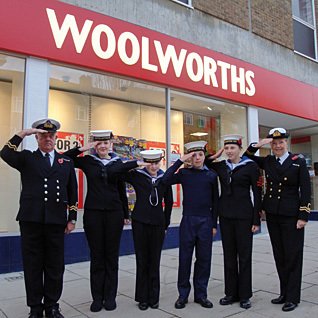
Woolworths staff went into 2008 confident and optimistic. With new WorthIt! ranges generating almost £2m a week of extra, profitable sales, work on a new value-led strategy continued at pace. On 30 October, the a new store opened at Bitterne near Southampton on England's South Coast. As the hundredth year began its sales exceeded expectations.
But behind the scenes the retail world and the wider economy were in turmoil, and Board changes were causing disquiet in the City. The quiet-spoken Chairman, Richard North, had decided to replace his long-serving CEO Trevor Bish-Jones after seven years at the helm. He told reporters the change would herald a new strategy and direction for the retailer.
Ostensibly the Company finances were on a strong footing, after a much heralded Asset-Based Lending deal which few really understood.
Despite declining trading results over an extended period, Bish-Jones had enjoyed a cordial relationship with City pundits, who fashioned him as "the most likeable CEO in British Retail". They believed in his Kids and Celebrations strategy and the move to embrace Multi-Channel Retail.
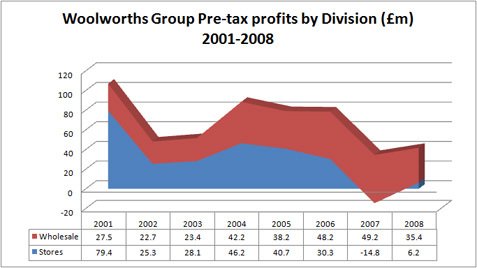
Observers only needed to look at the Group's trading performance to see that North was right that radical action was needed - but were unconvinced by the removal of the CEO.
The figures, drawn from Annual Reports from 2002 to 2008, charting segmented profit before management charges, show that profit from the stores, which exceeded £100m in the Kingfisher days had steadily fallen to the first loss in 95 years in 2007. Music and video publishing and distribution now contributed the lion's share of profits - and even those profits had declined as the Group digested two new acquisitions - Total Home Entertainment and Bertrams Books.
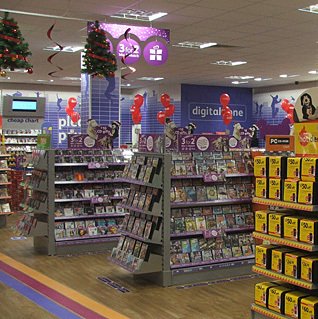
In August 2008 Bish-Jones sent a 'Dear John' email to his 27,000 staff. He asked everyone to embrace big changes under Steve Johnson. The new man, he said, had inherited 'two world class businesses' (2|Entertain and Entertainment UK) and 'the conundrum that is Woolworths'.
Under Bish-Jones the offer of music, video, games and books had grown exponentially. This flew in the face of major changes in the market. Over the same period the UK market for singles and CDs fell as consumers switched to downloads from the Internet. This brought intense price competition. In 1998 Woolworths advertised Albums on CD at prices 'from £14.99'. By 2008 to compete some were priced at £7.97, with margins of only a penny or two.
Until Tony Page launched WorthIt! in 2007, customer numbers in the stores had fallen steadily, from 7 million per week in 2001-2 to just 4½ million in 2006-7. Expressed differently, a thousand fewer people shopped in the High Street stores each day than the last. The Kids and Celebrations formula, seemed more popular with the City than with the clientele.
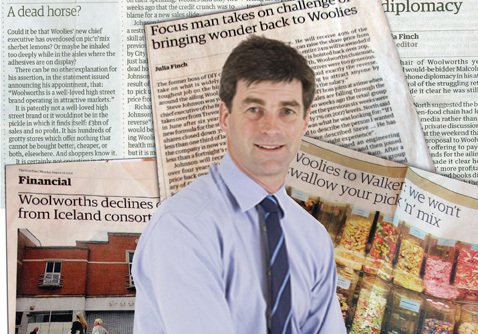
By the time Steve Johnson, a gregarious 44 year-old Yorkshireman, took the helm, a media whispering campaign had grown into a frenzy of speculation. A bid to buy the High Street stores by former Woolworth Trainee turned Iceland supremo Malcolm Walker, had focused attention on their poor profit performance.
Many were surprised that the Group did not accept the £100m offer. The reasons for rejection, it seems, were in the small print. Walker's offer was for the stores unencumbered by debt. Taking account of loans and the pension deficit, effectively this would have meant a £200m+ write-off in the Group's books.
The City speculated that the CEO might repeat a stroke that he had pulled when at the helm of Focus DIY. It was sold to a private equity company for £1. Johnson denied this.

Johnson was blunt. His inaugural address at Head Office was filmed and distributed to the stores on DVD. For many viewers this was the first time that an Executive had acknowledged that there was a problem, albeit one that was 'fixable'. He had clear priorities. Stores urgently needed to clear redundant stocks, ignoring the impact on 'basis margin points' - a City indicator that had been treated like the Holy Grail under his predecessor.
The Board was finalising a new strategy and business plan for the Group, driving recovery over a three year period. It met daily to complete the task.
Debt was spiralling. The Wholesale Divsion needed an ever-increasing amount of working capital to service new third-party contracts, supplying Zavvi (formerly Virgin Megastores), WHSmith, Morrisons and Sainsbury. Fearing a collapse at Zavvi, the leadig credit insurer Atradius withdrew cover. The situation deteriorated when Euler Hermes and Coface also stopped protecting Woolworths' suppliers against any non-payment, forcing the retailer to pay more quickly than usual, eating into its reserves. The credit crunch was biting.

Throughout the first half of 2008 store trading was buoyant. The gloomy economic scene across the UK, which saw big-name retailers recording double-digit sales decline, was less pronounced in Woolies stores, where sales were only a point or two down on the previous year. A series of sales promotions like 3 for 2 on toys kept customers loyal.
Behind the scenes plans were laid for celebrations and merchandise to mark the firm's hundredth anniversary in the UK in November 2009.

A 3 for 2 promotion on toys in November 2008 was a big hit. The measure was initially intended to generate cash, but proved a powerful sales tool too. Behind the scenes there was a secret crisis. The lenders did not accept the new business plan or the CEO's plan to sell the High Street stores to a private equity group. It seemed that, despite denials, Johnson had been brokering a deal to sell Woolies and its debts for £1 to the restructuring giant, Hilco. The Group would then be free to maximize its Wholesale Division. When the news broke more than 5,000 shoppers called in, offering to buy their favourite retailer for a pound! Despite a week's negotiations the banks and their representatives were not prepared to accept the proposed 'rescue' deal, instead forcing Administration.
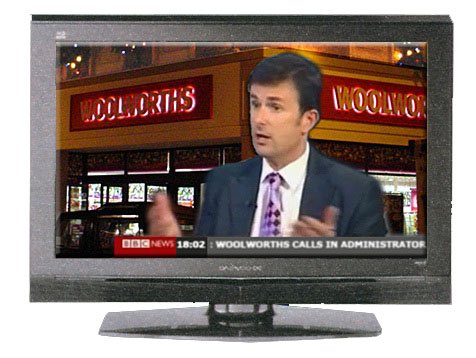
Staff heard the news not from the Company but on the BBC Six O'Clock News. Business Editor Robert Peston said Woolworths was a victim of the credit crunch. Although the firm had been struggling for some time, the failure had happened quickly, and would probably be the first of many. He feared for more than 20,000 staff at Woolies and EUK.
Some of the Directors, who were due to attend an emergency meeting with the CEO at 6pm (at which he had hoped to report a reprieve from the Banks), got the sad news in a Peston web-page, which the BBC published at 5,40pm.
The following day staff were reassured that Administration did not mean the end - it would allow a breathing space to find a buyer and get sorted out.
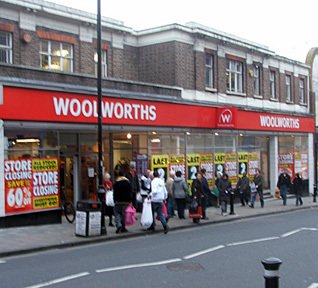
Leading Financial Services Company Deloitte LLP, who had been representing the Asset-Based Lenders' interests prior to the collapse, were chosen as the Administrator, backed by retail experts from Hilco, who had been negotiating to buy the High Street stores.
Intervention from Government Ministers led to assurances that store staff jobs would remain safe until after Christmas, but within a week more than 500 office and field-based managers were dismissed without notice and told to claim statutory redundancy pay from the Insolvency Service.
The same day a huge clearance event, billed as 'our largest sale in 100 years' was launched. Commentators noted that it was a closing down sale in all but name. The public reaction was astounding. It seemed that the whole nation went to Woolworths for one last look, stripping the shelves of own-label products and quickly leaving the stores running on empty.
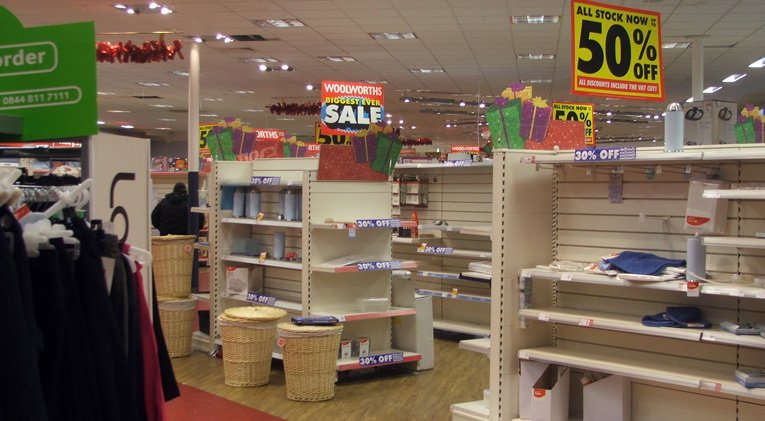
Within two weeks of the Administration beginning, and despite talks with a number of parties and considerable speculation about a buy-out by television dragon Theo Paphitis or former Kingfisher supremo Sir Geoffrey Mulcahy, Deloitte concluded that a sale was unlikely and that they should plan for an orderly exit. All products were cut in price. Store Managers were told to liquidate everything, putting fixtures and fittings, staffroom furniture and store supplies up for sale. They were given targets of revenue to generate from such clearance and offered commission on any money raised above the minimum. Some approached the task with zeal, others could not bring themselves to sell off the firm's precious assets at well under their book value. The sale of fixtures largely put paid to any rescue as a going concern. A week before Christmas the Administrator published a closure schedule, with stores closing in four waves from 27 December to 5 January 2009 (later extended by a single day).
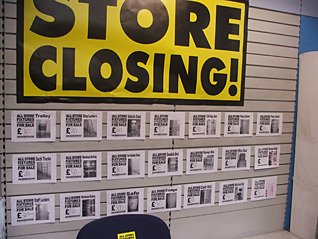
Just two days after Christmas, the first tranche of 200 stores closed. The final days were chaotic, with local tradespeople removing fixtures and fittings and the stores selling the last handful of products at sixpenny prices. Store colleagues faced the end with great dignity and decorum. Some of the younger staff were bemused by the depth of feeling from customers - the tangible sadness of some and the insensitivity of others. Many staff defiantly wore fancy dress for the final day, performing songs for customers before counting the shutters down for the last time.
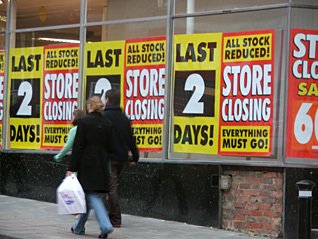
The final wave of stores were given a one day reprieve, finally closing on 6 January 2009 - 10 months short of the much vaunted 100th Birthday at the heart of the High Street. As four o'clock came around and shutters came down for the last time it seemed that the iconic brand had vanished from the British Retail scene - consigned to the pages of a Museum.
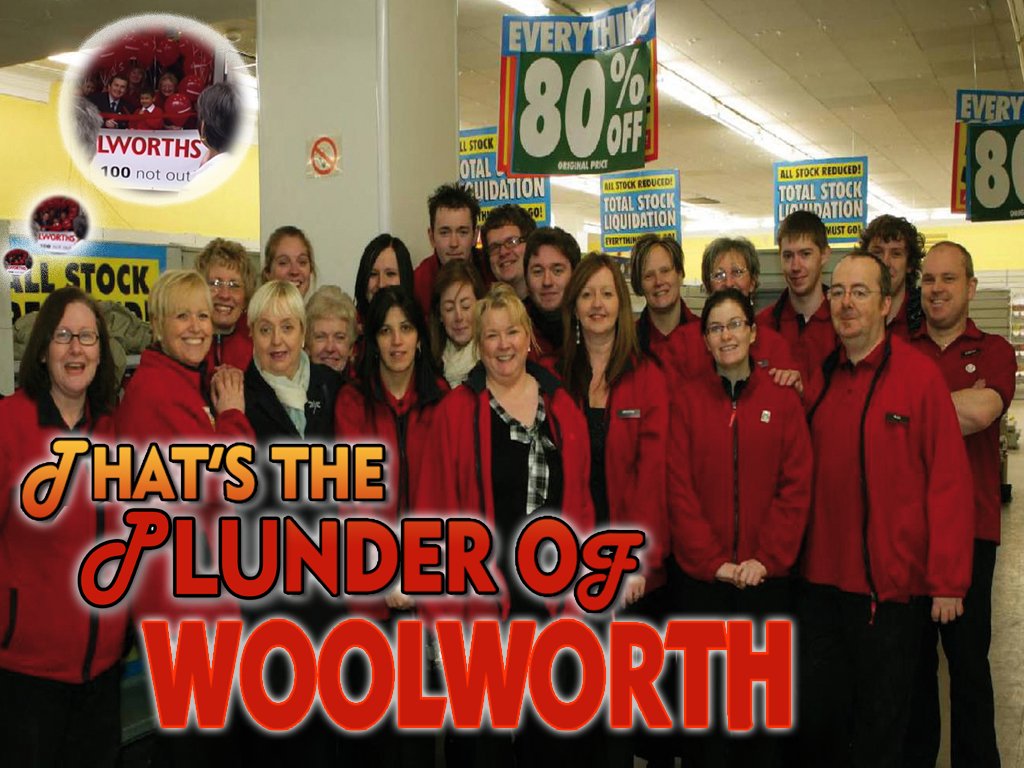
Being saved by Deloitte was a fate worse than death
... dashing any hope of a return to the High Streets of the UK
In the virtual world, the new Woolworths.co.uk needed no store staff
just a few Littlewoods techies and the celebrated delivery skills of Yodel.
All-in-all, shopping direct proved to be a Very different approach to retailing.
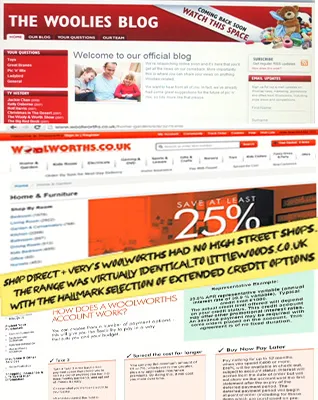
About a fortnight after the final wave of colleagues headed for Job Centre Plus, Deloitte stunned observers by announcing that the brand had been saved. They had already sold the Chad Valley toys name to Home Retail Group, the parent company of Argos and Homebase, and now part of J. Sainsbury. They had folowed this up by selling both the Ladybird and Woolworths brands. Shop Direct Group had already successfully taken Littlewoods on line, and had established an enviable array of Internet brands. They were clear that they believed there was no future in the High Street, and would protect their newly-acquired brand against anyone trying to open a "son of" chain that made any reference to the Woolworth Name. Instead the brand would 'ascend' to the Internet, moving on-line. The news came as a bitter disappointment to MD Tony Page, who had been in advanced discussions with the Administrator about getting some of the stores re-opened, as well as a number of Executives and Store Managers around the country who saw opportunities locally. None would have the financial muscle to take on the new owners, putting paid to any plans that they might have.
Within days more than half a million people had registered with the new woolworths.co.uk - long before it was ready to re-open. As the iconic brand entered its centenary year it was once again based in Liverpool, with big plans, a dynamic and imaginative management and an ultra-low cost base. Woolworths had come full circle and was ready to embark on the next chapter, revitalised and with high hopes and expectations, heading for a second century every bit as exciting as the first. Sadly it wasn't to last. After a period on-line Shop Direct - rebranded Very Group Ltd - undertook a strategic review and decided to retire the Woolworths name, directing shoppers instead to its popular very.co.uk brand. At least belatedly in 2022 they did the honourable thing and sold the marque to a chain of proper shops and a passion for the brand to rival the Founder himself.
Saving the best until last - new news in 2024
Here we grow again?
In the 2020s as part of a tidying-up process Very Group plc began to look for potential purchasers of the dormant British Woolworth franchise In January 2024 it was announced that the German Woolworth had bought the brand and the right to operate shops in the United Kingdom, Ireland and various other Continental European countries, and the web address was pointed to the new owner. They have since announced a major expansion programme, which will build on the extraordinary growth that the Company has achieved since 2010. The CEO understands the British market very well, having overseen the huge expansion and success of the Aldi supermarket chain in the country before moving on to his new role. In late January 2024 he teased British journalists by telling them that he had a dream of a new chain in the United Kingdom in due course, with more information to follow at a later date. For many Woolworths lovers - whether shoppers or former employees - this was simply the best news. All would wish the new owners every success as they shape their plans.
Woolworth is an iconic brand that shaped modern retailing. The renaissance under new owners in Germany since 2010 shows that it still has plenty of potential. 145 years after Frank Woolworth opened his first successful store in Lancaster, Pennsylvania he would feel at home in a German Woolworth store today. It offers the same outstanding value that set his brand apart, on a broad, well-planned range of lines for the home and all of the family, with a young, dynamic team and a super-efficient buying team and supply chain that keeps costs down and passes the savings on to shoppers. The Woolworths Museum wishes the new brand owners every success as they digest their new acquisitions and pursue progress that is already seeing Woolworth growing faster in Germany and Poland than at any time since the German subsidiary was incorporated in 1926, and at a faster pace than it ever achieved in North America or the United Kingdom. There are links to their website in English or Germany in the top menu of every museum page where you can you can catch up on progress as their plans develop. Why not take a look?.
Shortcuts to related content
21st Century Gallery
Germany
Potted history of F.W. Woolworth in Germany 1890 to 2024
January 2024: Superstar CEO Roman Heini shares his "pipe dream" for European expansion
UK
New values and a new direction
Visit a new-look Woolworths Out-of-Town, as it opened in 2005
Navigation